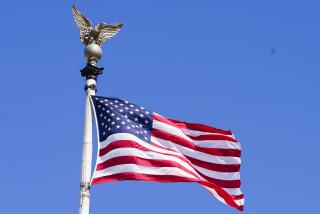Several major retailers ban sales of Confederate flag
- Share via
A growing number of retailers are halting sales of the Confederate flag and related merchandise in reaction to its image as a symbol of racial hate, burnished by photos of the man accused of gunning down nine African Americans in a Charleston, S.C., church.
At least one manufacturer shared the retailers’ sentiment, deciding it would also halt production of the Confederate battle flag.
On Tuesday, Target Corp., EBay Inc. and other retailers followed the lead of Wal-Mart Stores Inc. and Sears Holding Corp. in saying they would stop selling the flag in the face of growing outrage over its celebration as a racist symbol.
Dylann Roof, a 21-year-old white man arrested in last week’s killings, embraced the flag as a symbol of his racist ideology as he posed with it in photos. He also boasted about his racist views online.
Saying they recognized the divisiveness of the flag, retailers started pulling Confederate merchandise from store shelves and online marketplaces to avoid alienating customers.
“We never want to offend anyone with the products that we offer,” Wal-Mart spokesman Brian Nick said.
The announcements followed South Carolina Gov. Nikki Haley’s call Monday to remove the Confederate flag from the state Capitol grounds.
“We have a process in place to help lead us to the right decisions when it comes to the merchandise we sell,” Nick said Tuesday. “Still, at times, items make their way into our assortment improperly. This is one of those instances.”
Sears Holding said it was removing Confederate flag merchandise from its Sears and Kmart online stores. The company said Confederate flag merchandise was not sold in bricks-and-mortar stores.
Online marketplace EBay said it would prohibit sales of Confederate flags and many items displaying the flag because “it has become a contemporary symbol of divisiveness and racism,” spokeswoman Johnna Hoff said.
“This decision is consistent with our long-standing policy that prohibits items that promote or glorify hatred, violence and racial intolerance,” she said.
Civil rights leaders called on Jeff Bezos, chief executive of Amazon.com Inc., to follow the lead of Wal-Mart and Sears and stop sales of the Confederate flag.
“Amazon now has an opportunity to again prove it is a good corporate citizen and join with other major retailers, business leaders and elected officials that now call for an end to sales and displays of a symbol that stands for hate and bigotry,” said Earl Ofari Hutchinson, president of the Los Angeles Urban Policy Roundtable.
Amazon did not comment, but Tuesday afternoon many Confederate flags were listed on the site as unavailable for sale. The three best-selling items on its site over the last 24 hours had been Confederate flags, with sales of the most popular flag up 5,466%.
As major retailers hurried to ban the Confederate flag, some websites saw a bonanza in sales.
Kerry McCoy, owner of flagandbanner.com in Arkansas, said the site sold 50 lapel pins of the Confederate flag Monday and even more Tuesday. Normally, Confederate flag sales make up less than 1% of its business, McCoy said.
“Not everybody that uses the Confederate flag is doing it for hate,” she said. “Some of them have a family member that fought in that war. I’m not going to deny one sector of Americans the right to fly the flag of their choice.”
At least one flag manufacturer said it would stop making Confederate flags.
“Unfortunately sometimes it takes an event like this to kind of focus you on doing the right thing,” said Reggie VandenBosch, vice president of sales at Valley Forge Flag Co. in Wyomissing, Pa.
Companies including Target, online handmade marketplace Etsy and mall chain Spencer Gifts also said they would ban sales of Confederate flag merchandise.
Automaker BMW, one of South Carolina’s largest employers, said Tuesday it “applauds the courage” of Haley in calling for the Confederate flag to be removed from the Capitol grounds.
Her stand was an about-face from a year ago, when Haley, a Republican, defended the Confederate flag on the statehouse grounds. She said then that banning the flag was a “sensitive issue.”
“What I can tell you is over the last three and a half years, I spent a lot of my days on the phones with CEOs and recruiting jobs to this state,” Haley said at the time. “I can honestly say I have not had one conversation with a single CEO about the Confederate flag.”
samantha.masunaga@latimes.com
Times staff writer Michael Muskal contributed to this report.
More to Read
Inside the business of entertainment
The Wide Shot brings you news, analysis and insights on everything from streaming wars to production — and what it all means for the future.
You may occasionally receive promotional content from the Los Angeles Times.











